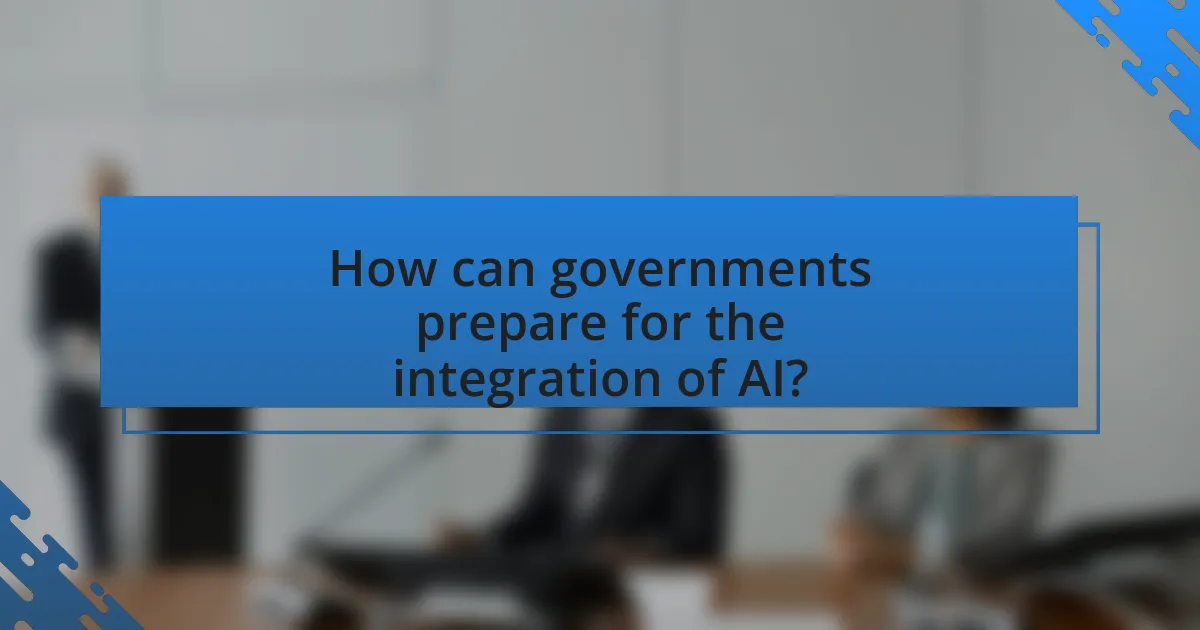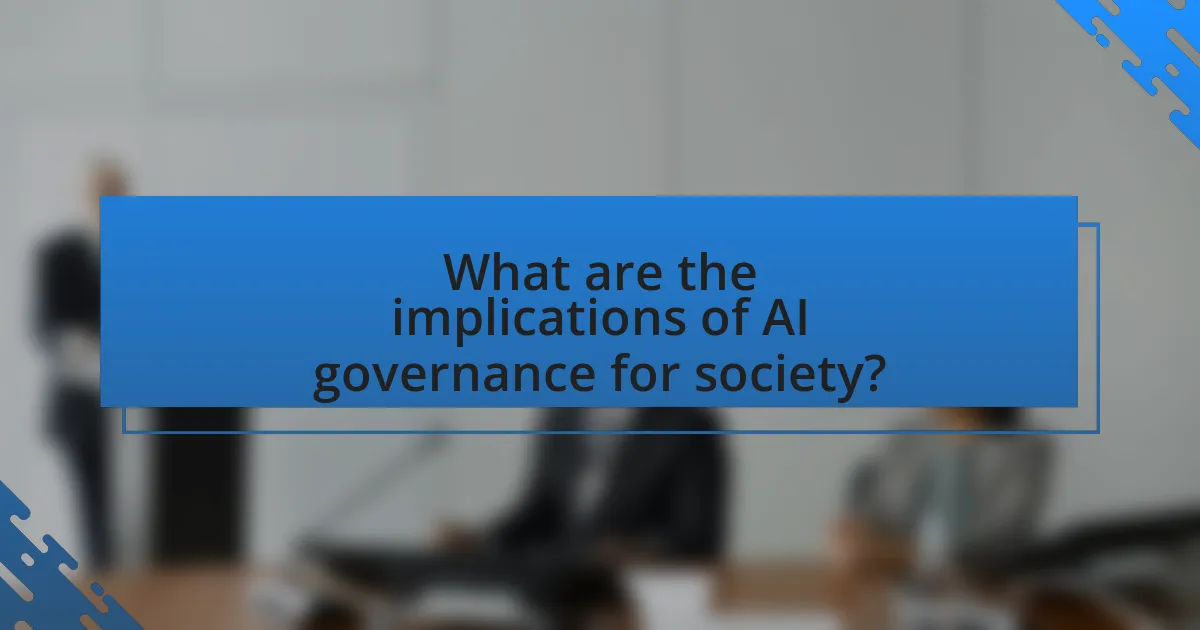The article examines the future of governance in the context of artificial intelligence (AI), highlighting how AI technologies are being integrated into public administration to enhance decision-making, efficiency, and transparency. Key technologies such as machine learning, natural language processing, and big data analytics are transforming governance by improving public service delivery and facilitating citizen engagement. However, the article also addresses significant challenges, including ethical dilemmas related to bias, accountability, and transparency, as well as the need for robust regulatory frameworks. It emphasizes the importance of collaboration among stakeholders and the role of civil society in shaping responsible AI governance to ensure that the benefits of AI are realized while mitigating potential risks.

What is the Future of Governance in an Era of Artificial Intelligence?
The future of governance in an era of artificial intelligence will increasingly involve the integration of AI technologies to enhance decision-making, efficiency, and transparency in public administration. Governments are adopting AI for data analysis, predictive modeling, and automating routine tasks, which can lead to more informed policy-making and improved public services. For instance, AI-driven analytics can help identify social issues and allocate resources more effectively, as seen in cities like Barcelona, which uses AI to optimize urban planning and resource distribution. Additionally, AI can facilitate citizen engagement through chatbots and digital platforms, allowing for real-time feedback and participation in governance processes. However, this shift also raises concerns about data privacy, algorithmic bias, and the need for regulatory frameworks to ensure ethical AI use in governance.
How is artificial intelligence transforming governance?
Artificial intelligence is transforming governance by enhancing decision-making processes, improving public service delivery, and increasing transparency. AI systems analyze vast amounts of data to provide insights that inform policy decisions, enabling governments to respond more effectively to citizen needs. For instance, predictive analytics can identify trends in public health or crime, allowing for proactive measures. Additionally, AI-powered chatbots and virtual assistants streamline citizen interactions with government services, making them more accessible. A study by the McKinsey Global Institute found that AI could potentially increase government productivity by up to 20%, demonstrating its significant impact on operational efficiency.
What are the key technologies driving this transformation?
The key technologies driving the transformation in governance due to artificial intelligence include machine learning, natural language processing, blockchain, and big data analytics. Machine learning enables predictive analytics for policy-making, allowing governments to anticipate social trends and needs. Natural language processing facilitates improved communication between citizens and government entities, enhancing public engagement and service delivery. Blockchain technology ensures transparency and security in transactions and record-keeping, which is crucial for trust in governance. Big data analytics provides insights from vast amounts of data, enabling data-driven decision-making and efficient resource allocation. These technologies collectively enhance the efficiency, transparency, and responsiveness of governance systems.
How does AI influence decision-making processes in governance?
AI significantly influences decision-making processes in governance by enhancing data analysis, improving predictive modeling, and facilitating citizen engagement. Governments utilize AI algorithms to analyze vast amounts of data, which allows for more informed policy decisions based on empirical evidence rather than intuition. For instance, AI can identify trends in public health data, enabling timely interventions during crises, as seen during the COVID-19 pandemic when AI tools helped track virus spread and resource allocation. Additionally, AI-driven predictive analytics can forecast the outcomes of various policy options, allowing policymakers to choose strategies with the highest likelihood of success. Furthermore, AI enhances citizen engagement through chatbots and automated systems that streamline communication between governments and the public, ensuring that citizen feedback is integrated into the decision-making process. This integration of AI leads to more transparent, efficient, and responsive governance.
What challenges does governance face in the age of AI?
Governance faces significant challenges in the age of AI, primarily due to issues of accountability, transparency, and ethical considerations. The rapid advancement of AI technologies often outpaces regulatory frameworks, leading to difficulties in ensuring that AI systems operate within legal and ethical boundaries. For instance, the deployment of AI in decision-making processes can result in biased outcomes if the underlying algorithms are not properly audited, as evidenced by studies showing that AI systems can perpetuate existing societal biases. Additionally, the lack of transparency in AI algorithms complicates the ability of governance structures to hold entities accountable for decisions made by these systems. This situation is further exacerbated by the global nature of AI development, which creates challenges in establishing consistent regulatory standards across different jurisdictions.
What ethical dilemmas arise from AI in governance?
AI in governance presents several ethical dilemmas, primarily concerning bias, accountability, and transparency. Bias arises when AI systems reflect or amplify existing societal prejudices, leading to unfair treatment of certain groups. For instance, a study by ProPublica in 2016 revealed that an algorithm used in the criminal justice system disproportionately flagged African American individuals as high risk for reoffending, highlighting the risk of biased outcomes in decision-making processes.
Accountability becomes problematic when decisions made by AI systems lead to negative consequences, as it is often unclear who is responsible for those decisions—the developers, the users, or the AI itself. This ambiguity can hinder justice and recourse for affected individuals.
Transparency is also a significant concern, as many AI algorithms operate as “black boxes,” making it difficult for stakeholders to understand how decisions are made. This lack of clarity can erode public trust in governance systems that rely on AI. Overall, these ethical dilemmas necessitate careful consideration and regulation to ensure that AI is used responsibly in governance.
How can bias in AI systems affect governance outcomes?
Bias in AI systems can significantly distort governance outcomes by perpetuating inequalities and misinforming decision-making processes. When AI algorithms are trained on biased data, they can produce skewed results that favor certain demographics over others, leading to unfair policy implementations. For instance, a study by the AI Now Institute found that predictive policing algorithms disproportionately target minority communities, exacerbating existing social injustices. This bias can result in governance that lacks equity and fails to address the needs of all citizens, ultimately undermining public trust in governmental institutions.
What opportunities does AI present for improving governance?
AI presents significant opportunities for improving governance by enhancing decision-making processes, increasing transparency, and streamlining public services. For instance, AI can analyze vast amounts of data to provide insights that inform policy decisions, leading to more effective governance. Additionally, AI-driven tools can facilitate real-time monitoring of government activities, thereby increasing accountability and reducing corruption. According to a report by the McKinsey Global Institute, AI could potentially increase public sector productivity by up to 20%, demonstrating its capacity to optimize resource allocation and improve service delivery.
How can AI enhance public service delivery?
AI can enhance public service delivery by improving efficiency, accuracy, and accessibility of services. For instance, AI-driven chatbots can provide 24/7 assistance to citizens, reducing wait times and improving response rates. According to a report by McKinsey, implementing AI in public services can lead to a 20-30% increase in productivity, allowing government agencies to allocate resources more effectively. Additionally, AI can analyze large datasets to identify trends and optimize service delivery, ensuring that public services meet the evolving needs of the population.
What role does AI play in increasing transparency and accountability?
AI enhances transparency and accountability by automating data collection and analysis, enabling real-time monitoring of processes and decisions. This technology allows organizations to track actions and outcomes more effectively, thereby reducing the potential for corruption and mismanagement. For instance, AI-driven analytics can scrutinize financial transactions and public spending, revealing discrepancies that may indicate fraud. Furthermore, AI systems can provide insights into decision-making processes, making it easier for stakeholders to understand how and why decisions are made. This increased visibility fosters trust among citizens and stakeholders, as evidenced by studies showing that organizations employing AI for transparency report higher levels of public confidence.

How can governments prepare for the integration of AI?
Governments can prepare for the integration of AI by establishing comprehensive regulatory frameworks that address ethical, legal, and social implications. These frameworks should include guidelines for data privacy, algorithmic transparency, and accountability to ensure responsible AI deployment. For instance, the European Union’s General Data Protection Regulation (GDPR) serves as a model for protecting personal data while fostering innovation. Additionally, governments should invest in workforce development programs to equip citizens with the necessary skills for an AI-driven economy, as studies indicate that up to 85 million jobs may be displaced by AI by 2025, according to the World Economic Forum. By prioritizing these strategies, governments can effectively navigate the challenges and opportunities presented by AI integration.
What strategies should be implemented for effective AI governance?
Effective AI governance requires the implementation of clear regulatory frameworks, ethical guidelines, and accountability mechanisms. Regulatory frameworks should establish standards for AI development and deployment, ensuring compliance with safety and ethical norms. Ethical guidelines must address issues such as bias, transparency, and privacy, promoting fairness and trust in AI systems. Accountability mechanisms should include audits and assessments to evaluate AI systems’ performance and impact, ensuring that organizations are held responsible for their AI applications. For instance, the European Union’s AI Act aims to create a comprehensive regulatory framework that categorizes AI systems based on risk levels, demonstrating a proactive approach to governance.
How can policymakers ensure responsible AI development?
Policymakers can ensure responsible AI development by establishing clear regulatory frameworks that prioritize ethical standards and accountability. These frameworks should include guidelines for transparency, data privacy, and bias mitigation, which are essential for fostering public trust and safety in AI technologies. For instance, the European Union’s General Data Protection Regulation (GDPR) sets a precedent by enforcing strict data protection measures, demonstrating how effective regulation can safeguard individual rights while promoting innovation. Additionally, engaging diverse stakeholders, including technologists, ethicists, and the public, in the policymaking process can help identify potential risks and ethical dilemmas associated with AI, ensuring that policies are comprehensive and inclusive.
What frameworks exist for regulating AI in governance?
Several frameworks exist for regulating AI in governance, including the European Union’s AI Act, the OECD Principles on Artificial Intelligence, and the IEEE Global Initiative on Ethical Considerations in AI and Autonomous Systems. The European Union’s AI Act aims to create a comprehensive regulatory framework for AI, categorizing AI systems based on risk levels and imposing obligations on developers and users. The OECD Principles provide guidelines for responsible AI development, emphasizing transparency, accountability, and human rights. The IEEE Global Initiative focuses on ethical standards for AI technologies, promoting safety and well-being. These frameworks collectively address the challenges posed by AI in governance, ensuring that its deployment aligns with societal values and legal standards.
How can collaboration between stakeholders enhance AI governance?
Collaboration between stakeholders enhances AI governance by fostering diverse perspectives and expertise, which leads to more comprehensive and effective regulatory frameworks. When various stakeholders, including government agencies, private companies, academia, and civil society, work together, they can identify potential risks and ethical concerns associated with AI technologies more effectively. For instance, a study by the Partnership on AI highlights that multi-stakeholder engagement can improve transparency and accountability in AI systems, ultimately leading to better public trust and acceptance. This collaborative approach ensures that governance frameworks are not only technically sound but also socially responsible, addressing the needs and concerns of all affected parties.
What role do private sector partnerships play in AI governance?
Private sector partnerships play a crucial role in AI governance by facilitating collaboration between technology companies and regulatory bodies to establish ethical standards and best practices. These partnerships enable the sharing of expertise and resources, which is essential for developing frameworks that address the complexities of AI technologies. For instance, initiatives like the Partnership on AI, which includes major tech firms and non-profit organizations, aim to promote responsible AI development and deployment. Such collaborations help ensure that AI systems are designed with accountability, transparency, and fairness in mind, ultimately guiding the governance landscape in a rapidly evolving technological environment.
How can civil society contribute to AI governance discussions?
Civil society can contribute to AI governance discussions by advocating for ethical standards, transparency, and accountability in AI development and deployment. Organizations within civil society, such as non-profits and community groups, can mobilize public opinion, ensuring diverse perspectives are included in policy-making processes. For instance, the Partnership on AI, which includes civil society organizations, emphasizes the importance of stakeholder engagement in shaping AI policies. This involvement helps to address societal concerns and promotes equitable access to AI technologies, ultimately leading to more inclusive governance frameworks.

What are the implications of AI governance for society?
AI governance significantly impacts society by establishing frameworks that ensure ethical, transparent, and accountable use of artificial intelligence technologies. These frameworks are essential for mitigating risks associated with AI, such as bias, privacy violations, and job displacement. For instance, the European Union’s AI Act aims to regulate high-risk AI applications, promoting safety and fundamental rights, which reflects a growing recognition of the need for structured oversight. Furthermore, effective AI governance can foster public trust in AI systems, encouraging innovation while safeguarding societal values. This dual focus on regulation and trust is crucial as AI continues to permeate various sectors, influencing decision-making processes and societal norms.
How does AI governance impact citizen engagement?
AI governance significantly enhances citizen engagement by establishing frameworks that promote transparency, accountability, and inclusivity in decision-making processes. Effective AI governance ensures that citizens are informed about how AI systems operate and how their data is used, fostering trust and encouraging participation. For instance, initiatives like the European Union’s AI Act aim to regulate AI technologies, ensuring that citizens have a voice in the development and deployment of AI systems that affect their lives. This regulatory approach not only empowers citizens but also encourages public discourse on ethical AI use, ultimately leading to more democratic governance.
What tools can be used to facilitate citizen participation in AI governance?
Digital platforms, public forums, and collaborative decision-making tools can facilitate citizen participation in AI governance. These tools enable citizens to engage in discussions, provide feedback, and influence policy-making related to AI technologies. For instance, platforms like Pol.is allow for real-time public input on policy issues, while tools such as Decidim enable participatory budgeting and decision-making processes. Research indicates that inclusive digital engagement can enhance transparency and accountability in governance, as seen in case studies from cities like Barcelona, where citizen input directly shaped AI-related policies.
How can AI improve communication between governments and citizens?
AI can improve communication between governments and citizens by enabling real-time data analysis and personalized interactions. Through natural language processing and machine learning, AI systems can analyze citizen inquiries and feedback, allowing governments to respond more effectively and efficiently. For instance, chatbots powered by AI can provide instant answers to common questions, reducing wait times and improving accessibility. Additionally, AI can help identify trends in public sentiment by analyzing social media and other communication channels, allowing governments to tailor their messaging and policies to better meet the needs of their constituents. This approach has been supported by studies showing that AI-driven platforms enhance civic engagement and satisfaction, as evidenced by initiatives in cities like Los Angeles, where AI tools have been implemented to streamline communication between city officials and residents.
What are the long-term effects of AI on democratic processes?
The long-term effects of AI on democratic processes include enhanced voter engagement, increased polarization, and challenges to accountability. AI technologies can facilitate greater participation by providing personalized information and mobilizing voters, as seen in various campaigns that utilized data analytics to target specific demographics effectively. However, the same technologies can also exacerbate political polarization by creating echo chambers, where individuals are exposed primarily to information that reinforces their existing beliefs, leading to a fragmented public discourse. Furthermore, the use of AI in decision-making processes raises concerns about transparency and accountability, as algorithms can obscure the rationale behind political decisions, making it difficult for citizens to hold their leaders accountable. These dynamics suggest that while AI has the potential to improve democratic engagement, it also poses significant risks that could undermine the integrity of democratic processes.
How might AI influence electoral systems and voting behavior?
AI might influence electoral systems and voting behavior by enhancing voter engagement and streamlining the electoral process. For instance, AI-driven platforms can analyze voter preferences and tailor political messaging, leading to more personalized outreach. Additionally, AI can improve the efficiency of vote counting and fraud detection, as seen in the 2020 U.S. elections where AI tools were employed to monitor election integrity. These advancements can lead to increased voter turnout and trust in the electoral process, as evidenced by studies showing that targeted communication can significantly boost participation rates.
What safeguards are necessary to protect democratic integrity in an AI-driven world?
To protect democratic integrity in an AI-driven world, robust regulatory frameworks are essential. These frameworks should include transparency requirements for AI algorithms, ensuring that their decision-making processes are understandable and accountable. For instance, the European Union’s General Data Protection Regulation (GDPR) mandates that individuals have the right to explanation regarding automated decisions, which promotes accountability. Additionally, implementing ethical guidelines for AI development can prevent biases that undermine democratic values. Research from the AI Now Institute highlights the importance of inclusive stakeholder engagement in AI policy-making to ensure diverse perspectives are considered, thereby enhancing democratic legitimacy. Furthermore, continuous monitoring and evaluation of AI systems can help identify and mitigate risks to democratic processes, as evidenced by studies showing that unchecked AI can exacerbate misinformation and polarization.
What best practices should be adopted for AI governance?
Best practices for AI governance include establishing clear ethical guidelines, ensuring transparency in AI decision-making processes, and implementing robust accountability mechanisms. Ethical guidelines help organizations navigate moral dilemmas associated with AI deployment, while transparency fosters trust among stakeholders by allowing them to understand how AI systems operate. Accountability mechanisms, such as regular audits and compliance checks, ensure that AI systems adhere to established standards and regulations. Research from the European Commission emphasizes the importance of these practices, highlighting that effective governance frameworks can mitigate risks associated with AI technologies and promote responsible innovation.
How can governments ensure continuous learning and adaptation in AI governance?
Governments can ensure continuous learning and adaptation in AI governance by establishing dynamic regulatory frameworks that evolve with technological advancements. These frameworks should incorporate mechanisms for regular review and updates based on emerging AI trends, stakeholder feedback, and empirical data on AI impacts. For instance, the European Union’s AI Act aims to create a flexible regulatory environment that can adapt to new developments in AI technology, demonstrating a proactive approach to governance. Additionally, governments can foster collaboration with academia, industry, and civil society to gather diverse insights and best practices, ensuring that policies remain relevant and effective in addressing the complexities of AI.
What lessons can be learned from early adopters of AI in governance?
Early adopters of AI in governance demonstrate the importance of transparency and ethical considerations in implementing technology. For instance, the city of Barcelona utilized AI to improve urban planning while ensuring public engagement and accountability, which led to increased trust among citizens. Additionally, early adopters highlight the necessity of continuous training and upskilling for public officials to effectively leverage AI tools, as seen in Estonia’s digital governance initiatives that emphasize digital literacy. These examples underscore that successful AI integration in governance requires a focus on ethical frameworks and ongoing education to adapt to evolving technologies.





